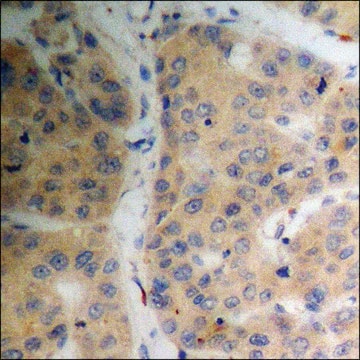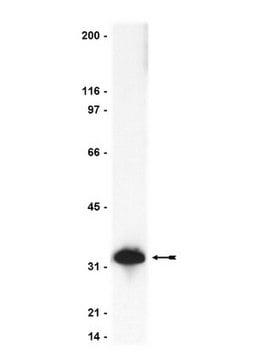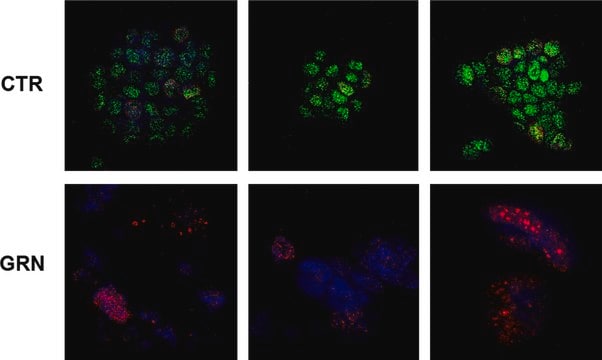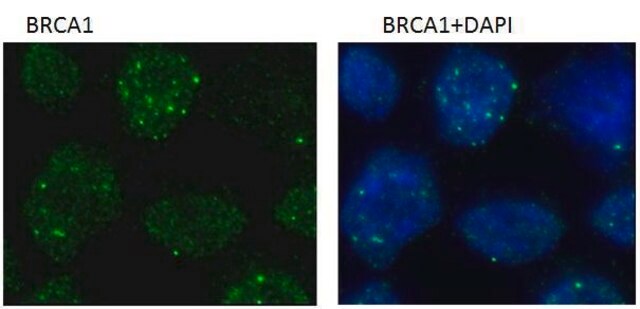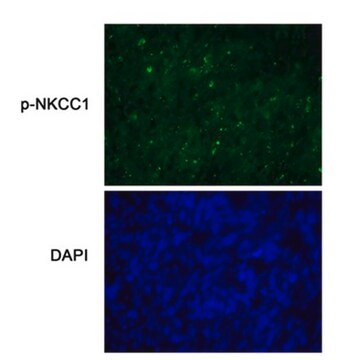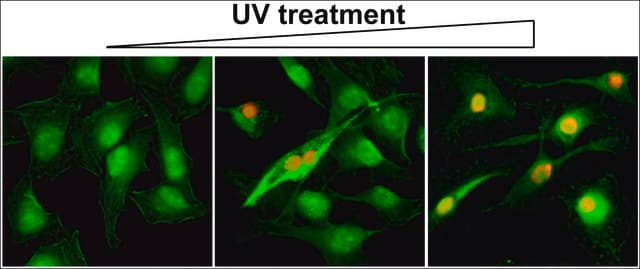Recommended Products
biological source
rabbit
Quality Level
antibody form
serum
antibody product type
primary antibodies
clone
polyclonal
species reactivity
human
manufacturer/tradename
Upstate®
technique(s)
western blot: suitable
isotype
IgG
NCBI accession no.
UniProt accession no.
shipped in
dry ice
target post-translational modification
phosphorylation (pSer422/pThr256)
Gene Information
human ... SGK1(6446)
Specificity
Recognizes phospho-SGK.
Immunogen
peptide corresponding to amino acids surrounding Ser255/Thr256 of human SGK1.
Application
Anti-phospho-SGK Antibody is an antibody against phospho-SGK for use in WB.
Not recommended for use with cell lysates.
Research Category
Signaling
Signaling
Research Sub Category
PI3K, Akt, & mTOR Signaling
PI3K, Akt, & mTOR Signaling
Quality
routinely evaluated by immunoblot detected phospho-SGK after phosphorylation of unactive SGK1 (Catalog # 14-332) with PDK1 (Catalog # 14-280)
Target description
48 kDa
Physical form
UnPurified whole rabbit antiSerum containing 30% glycerol and 0.035% sodium azide.
Unpurified
Storage and Stability
Maintain for 2 years at -20°C from date of shipment. Aliquot to avoid repeated freezing and thawing. For maximum recovery of product, centrifuge the original vial after thawing and prior to removing the cap.
Analysis Note
Control
PDK activated SGK samples
PDK activated SGK samples
Other Notes
Concentration: Please refer to the Certificate of Analysis for the lot-specific concentration.
Legal Information
UPSTATE is a registered trademark of Merck KGaA, Darmstadt, Germany
Disclaimer
Unless otherwise stated in our catalog or other company documentation accompanying the product(s), our products are intended for research use only and are not to be used for any other purpose, which includes but is not limited to, unauthorized commercial uses, in vitro diagnostic uses, ex vivo or in vivo therapeutic uses or any type of consumption or application to humans or animals.
Not finding the right product?
Try our Product Selector Tool.
Storage Class Code
10 - Combustible liquids
WGK
WGK 1
Certificates of Analysis (COA)
Search for Certificates of Analysis (COA) by entering the products Lot/Batch Number. Lot and Batch Numbers can be found on a product’s label following the words ‘Lot’ or ‘Batch’.
Already Own This Product?
Find documentation for the products that you have recently purchased in the Document Library.
Jian-Bang Xu et al.
Signal transduction and targeted therapy, 9(1), 74-74 (2024-03-26)
Severe acute respiratory syndrome coronavirus 2 (SARS-CoV-2) infection disrupts the epithelial barrier and triggers airway inflammation. The envelope (E) protein, a core virulence structural component of coronaviruses, may play a role in this process. Pathogens could interfere with transepithelial Cl-
J Park et al.
The EMBO journal, 18(11), 3024-3033 (1999-06-05)
Serum and glucocorticoid-inducible kinase (SGK) is a novel member of the serine/threonine protein kinase family that is transcriptionally regulated. In this study, we have investigated the regulatory mechanisms that control SGK activity. We have established a peptide kinase assay for
Joseph R Shaw et al.
Cellular physiology and biochemistry : international journal of experimental cellular physiology, biochemistry, and pharmacology, 22(1-4), 69-78 (2008-09-05)
Killifish are euryhaline teleosts that adapt to increased salinity by up regulating CFTR mediated Cl(-) secretion in the gill and opercular membrane. Although many studies have examined the mechanisms responsible for long term (days) adaptation to increased salinity, little is
Yi-Lin Zhang et al.
Mucosal immunology, 11(4), 1149-1157 (2018-03-17)
Airway epithelial cells harbor the capacity of active Cl- transepithelial transport and play critical roles in modulating innate immunity. However, whether intracellular Cl- accumulation contributes to relentless airway inflammation remains largely unclear. This study showed that, in airway epithelial cells
Phase II trial of temsirolimus in patients with metastatic breast cancer.
Gini F Fleming,Cynthia X Ma,Dezheng Huo,Husain Sattar,Maria Tretiakova,L Lin,Olwen M Hahn et al.
Breast Cancer Research and Treatment null
Our team of scientists has experience in all areas of research including Life Science, Material Science, Chemical Synthesis, Chromatography, Analytical and many others.
Contact Technical Service